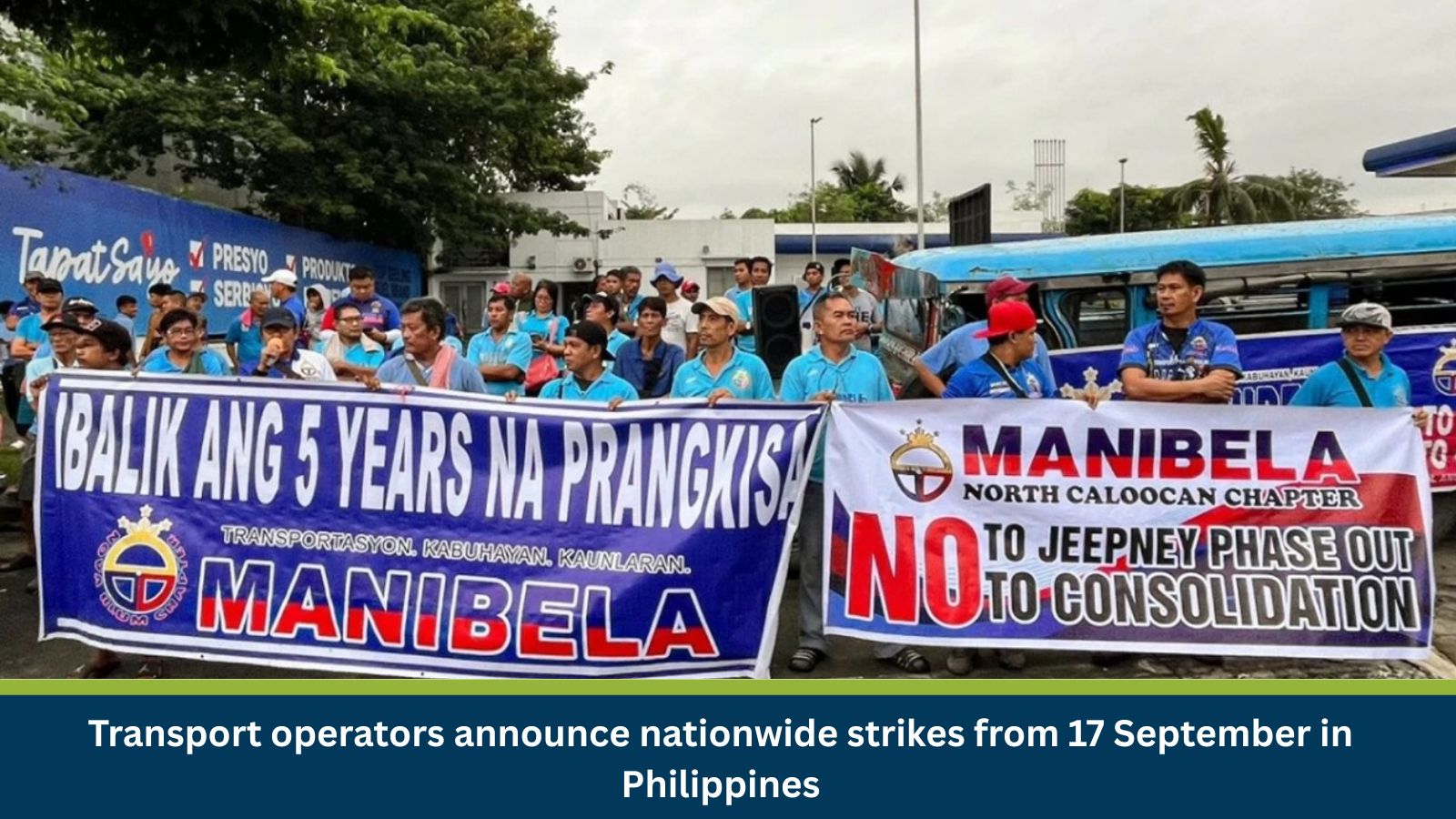What is Risk Analysis in the Context of Travel Risks Events
This report assesses the risks of a nationwide transport strike in the Philippines. The analysis helps organizations prepare for potential operational challenges related to workforce mobility, localized disruptions, and safety protocols in response to the demonstration. It is a critical tool for ensuring employee safety and operational resilience. Based on past incidents, such strikes, although primarily logistical, have the potential to escalate if not managed correctly.
Executive Summary
- Date of Incident: 17 September 2025
- Location: Metro Manila, Metro Manila, Philippines
- Risk Category: Travel Risks
- Severity Score: 3/5
- Confidence Level: 85%
A nationwide transport strike initiated by Piston and Manibela is set to commence on Wednesday, 17 September, projected to last for three days. Based on historical analysis of similar actions by these groups (e.g., strikes in Nov 2023, June 2024, Sept 2024), the strike is expected to cause moderate to significant disruption primarily in major urban centers and key regional hubs, rather than a complete paralysis of the transport system. While government mitigation efforts (e.g., free rides) have historically reduced severe impacts, localized commuter stranding and traffic congestion are highly probable. The underlying issue of the PUV modernization program remains a contentious point, suggesting recurrence of such strikes. We forecast a moderate severity impact on public mobility and business operations, with high confidence in this assessment given the consistent patterns observed in previous strikes.
Known Hotspots and Sensitive Areas
- Metro Manila: Expected to see significant disruptions on EDSA, Commonwealth Avenue, España Boulevard, and major routes connecting to central business districts and government centers.
- Other Affected Regions: Main roads in Cebu City, Davao City, San Fernando (Pampanga), and Cagayan de Oro are also anticipated to face similar congestion.
- Sensitive Areas: Major government buildings (e.g., Department of Transportation (DOTr) and Land Transportation Franchising and Regulatory Board (LTFRB) offices), major public markets, university districts, and transportation hubs.
Impact on Transportation and Services
Widespread public transport disruption is highly probable, particularly affecting jeepney services, which are central to the strike. Commuters in Metro Manila, Central Luzon, Central and Western Visayas, and specific areas in Mindanao are expected to face significant challenges. The strike will also affect business operations, causing potential employee absenteeism due to commuting difficulties and reduced customer foot traffic. Localized delays in last-mile delivery and supply chain disruptions are also expected.
Recommended Actions
- Prioritize Employee Mobility and Safety: Implement immediate flexible work arrangements, including mandatory remote work for eligible roles. For essential on-site personnel, activate company-sponsored shuttle services or provide verified ride-hailing subsidies. HR and Operations must issue clear guidelines on reporting protocols, attendance flexibility, and emergency contacts, tracking employee whereabouts and needs daily.
- Secure Critical Supply Chains and Logistics: Proactively communicate with all suppliers and clients regarding potential disruptions to inbound material deliveries and outbound product/service distribution. Expedite urgent shipments prior to the strike and identify alternative transport options (e.g., non-striking private couriers, smaller vehicles for last-mile) for the strike duration.
- Maintain Client Service Continuity and Proactive Communication: Establish a central communication plan for clients and stakeholders, detailing potential service impacts and the company’s mitigation strategies.
- Activate and Adapt Business Continuity Plans: Convene the Business Continuity Management (BCM) team to assess real-time operational impacts on all critical functions. Establish a dedicated command center for monitoring local transport conditions and employee status, enabling rapid deployment of backup operational sites or alternative process flows.
Emergency Contacts
- Police: 117
- Fire Department: 160 or 8426 0219
- Ambulance: 143
- National Emergency: 911
Final Thoughts
The baseline scenario anticipates the transport strike proceeding as planned for three days, causing localized but significant disruptions. There is a moderate risk of escalation if the strike garners wider support or is extended. While the strike’s immediate impact is primarily logistical, the potential for it to merge with other protest movements, such as the upcoming ‘Trillion Peso March’, presents a more severe long-term threat. Businesses should prepare for the baseline scenario while being mindful of the potential for escalation.
Stay ahead of operational risks with real-time alerts, scenario modeling, and expert advisories with datasurfr’s Predict. Start your 14-day free trial of Datasurfr’s Risk Intelligence Platform today.






